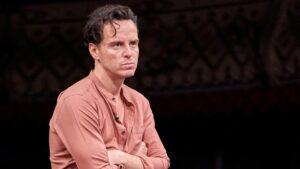Andrew Scott rules in monologue live streamed from Old Vic
★★★★

So it’s back on the sofa to watch Three Kings with Andrew Scott streaming live on Zoom from the Old Vic stage. It wasn’t the same as being there but there was something exciting about knowing you’re watching Mr Scott perform right at that moment and, as in a visit to the theatre, especially for you.
The play was written by Stephen Beresford especially for Andrew Scott and it did bring out all his best qualities as an actor. Monologues really are nearly the best kind of theatre to show on TV, with that concentration on the face- and what a face. What that man can do with a raised eyebrow, a stifled giggle or an intense stare.
Andrew Scott is Patrick the narrator who tells the story of his relationship with his absentee father. He also plays many other characters and switches between them with dazzling virtuosity, in fact with the deftness of a bar trick known as the three kings.
This involves moving around three coins and we are introduced to it at the beginning and see the puzzle resolved at the end. Patrick is challenged to solve the riddle in exchange for seeing his absent father again. This unfeeling parent has no intention of returning and at the end, when Patrick shows how the trick is done, like all tricks revealed the magic has gone along with any illusions he had about his father. There only remains a question of whether the parent deserves forgiveness. (A question any self-aware parent might ask of themselves, no matter how kind and loving they’ve been.)
The three kings trick also represents three generations who inherit the unpleasant characteristics of the father much as the title of king passes from father to son, because the secret of the trick is that the force of one coin passes on the next and from that to the third.
On a set empty apart from a box that acts as a table and a chair, we meet Patrick as an 8 year old child seeing his absent father for the first time. He conjures up the child’s hope and anxiety beautifully. There is a moment when he betrays his mother to ingratiate himself with this charismatic figure and you see the sheepish look of a child’s face. You also experience the insouciance of this man who cannot love. We meet many other characters: sometimes it’s only a glimpse but all perfectly summed up in a turn of phrase or a gesture.
Patrick becomes a man, talking to his father’s oldest friend. The screen- and you’ve been wondering why it was presented in letterbox style- now splits in two, representing, I think, that Patrick has matured into the next generation, already taking on characteristics of his father, drinking too much, being unemotional, but perhaps more aware of his failings.
There is a further encounter between Patrick and his father. This time he discovers not only has the man remarried but has another son. His ‘longed-for son and heir’, as he puts it. It’s such a blow. Andrew Scott shows us both the casual cruelty of the father’s action and almost simultaneously Patrick’s reaction, as if all the life has gone out of his face .
Patrick meets his half brother, another Patrick, again bringing life to both characters, now across three screens, because we’re learning that this brother is now himself an absentee father to a third generation.
As a director, Matthew Warchus clearly gets the best out of Andrew Scott but I didn’t feel the split screen worked. Admittedly it gave the chance to see him from different angles and created the sense of a conversation, but I found it distracted from that wonderfully expressive face. The thing is, Andrew Scott isn’t separate people when he’s acting these characters, they all exist at once within him and he moves between them with quantum motion, often employing no more than a slow blink or a tightening smile.
If I’ve made it sound like this actor simply has a box of tools or tricks that he draws upon, then all I can say is it’s a very big box indeed and the tool he pulls out is always just right for the job.
Three Kings is a quietly effective look at the way a child attaches themself to a parent or parent figure and how their life can be devastated when they are let down by that person. With no disrespect to the richness of Stephen Beresford’s writing, it was all on one note, lacking lack any highs and lows or unexpected turns. It seemed to me Andrew Scott was lifting a good play into the realms of greatness by the quality of his acting.
Patrick meets his father for a final time when this self-centred man is dying, and hoping for God’s forgiveness. The camera focuses on Andrew Scott’s tearful face as the metaphorical curtain falls.
Click here to watch this review on YouTube
The five performance run is over but I hope The Old Vic decides to offer the recording to a wider audience and raise some more much-needed income. Keep an eye out for future so-called In Camera productions from the Old Vic– the streaming quality is excellent and the price very reasonable. And if you want to see another monologue by Andrew Scott which is just as emotional and more tense than Three Kings, rent Sea Wall on Vimeo. (Here’s my review of Sea Wall)